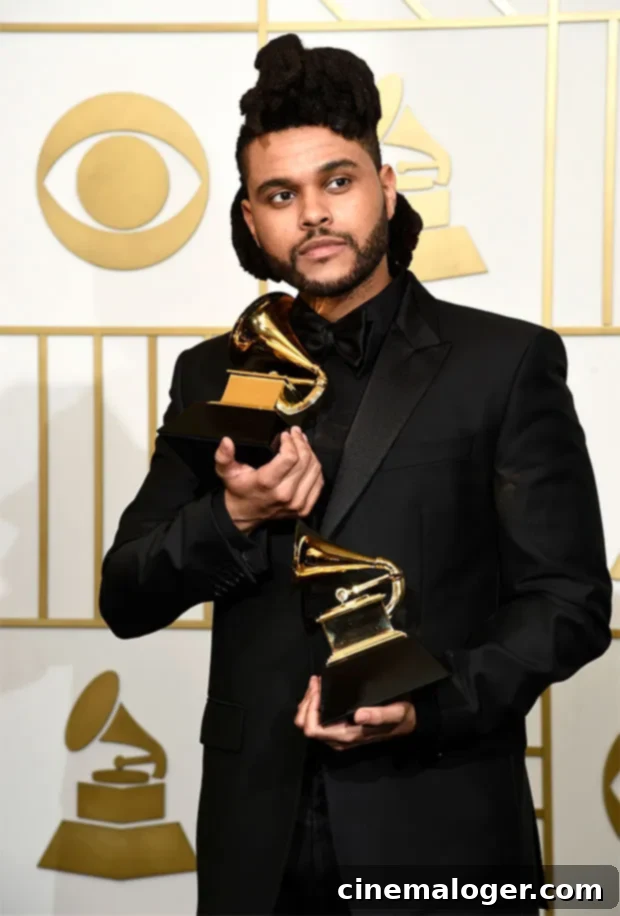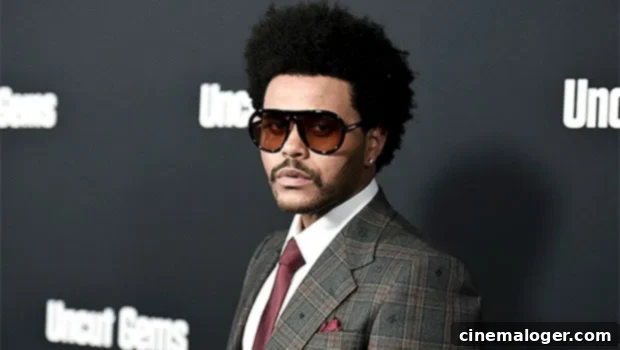The Weeknd’s Grammy Snub: Unpacking the ‘After Hours’ Omission, Super Bowl Controversy, and Calls for Transparency
The music world experienced a collective shockwave following the announcement of the 2021 Grammy nominations, largely due to the complete exclusion of The Weeknd. His monumental album, After Hours, and its accompanying global phenomenon, “Blinding Lights,” had unequivocally dominated the charts and cultural conversation throughout 2020. This unexpected snub prompted the artist, born Abel Makkonen Tesfaye, to swiftly and publicly accuse the Recording Academy of corruption, demanding “transparency” for himself, his fans, and the entire industry. His powerful statement ignited a fierce, widespread debate about the integrity and relevance of the prestigious Grammy Awards.
The Grammys remain corrupt. You owe me, my fans and the industry transparency…
— The Weeknd (@theweeknd) November 25, 2020
The Alleged Super Bowl Ultimatum: A Brewing Conflict of Interest
In the immediate aftermath of The Weeknd’s accusatory tweet, a significant report emerged from TMZ, claiming to provide crucial context for the Grammy oversight. According to their sources, Abel Tesfaye was allegedly faced with a stark ultimatum: either commit to performing at the Grammy Awards ceremony or fulfill his commitment to headline the much-anticipated Super Bowl LV Halftime Show. This supposed conflict stemmed from the tight scheduling of the two high-profile events, with the Grammys slated for January 31, 2021, and the Super Bowl just a week later on February 7, 2021, in Tampa, Florida.
The TMZ report further alleged that despite eventual negotiations that allowed Abel to participate in both events, these discussions were reportedly “very testy.” The implication was clear: the “bitter back-and-forth talks” between The Weeknd’s representatives and Grammy officials might have “pissed off Grammy honchos,” thereby influencing the nomination process to his detriment. While The Grammy Awards have a history of valuing exclusivity and prioritizing their own event, the idea that an artist’s choice of another major performance platform could result in punitive action from an awards body sparked widespread concern. This potential scenario raised serious questions about the impartiality of the nominations and whether artists are truly free to navigate their careers without facing repercussions from powerful institutions like the Recording Academy.
The Recording Academy’s Official Rebuttal and Plea for Understanding
Responding directly to the escalating controversy and The Weeknd’s pointed accusations, Recording Academy chief Harvey Mason Jr. released a comprehensive statement through Variety. He vehemently denied any connection between The Weeknd’s scheduled Super Bowl LV performance and his lack of nominations for the 2021 Grammy Awards. “There were a record number of submissions in this unusual and competitive year. We understand that The Weeknd is disappointed at not being nominated,” Mason Jr. acknowledged, attempting to diffuse the tension while affirming the Academy’s position.
In his statement, Harvey Mason Jr. went on to express his personal bewilderment at the outcome, admitting that he, too, was “surprised” by The Weeknd’s complete absence from the nominations list. To definitively address the Super Bowl allegations, he clarified the timeline: “To be clear, voting in all categories ended well before The Weeknd’s performance at the Super Bowl was announced, so in no way could it have affected the nomination process.” This aimed to debunk the central claim of the TMZ report, asserting that the events were chronologically separate and could not have influenced each other. Mason Jr. further emphasized the Academy’s appreciation for The Weeknd’s talent, stating, “We were thrilled when we found out he would be performing at the upcoming Super Bowl and we would have loved to have him also perform on the Grammy stage the weekend before.” Despite these assurances, a significant portion of the public and many within the music industry remained skeptical, finding it difficult to reconcile The Weeknd’s colossal success with the Academy’s official explanation for his stunning omission.
The Weeknd’s Unprecedented Year: A Billboard Dominance Story
The magnitude of the public and industry outrage largely stemmed from the undisputed, unprecedented success The Weeknd enjoyed throughout 2020. His fourth studio album, After Hours, launched in March of that year, was not merely a commercial hit but a profound cultural milestone. The album soared to the coveted No. 1 position on the Billboard 200 Chart, a testament to both its artistic merit and widespread appeal. It spawned a series of highly successful singles, with “Blinding Lights” standing out as an undeniable global anthem and a record-breaking phenomenon. This single alone transcended typical chart performance, inspiring one of the biggest viral dance trends on TikTok and saturating airwaves across continents.
“Blinding Lights” not only secured a consistent top ten presence on Billboard’s Hot 100 chart but also achieved an extraordinary feat: it broke the record for the most weeks spent on Billboard’s Radio Songs chart. This historic achievement surpassed the previous record held by the Goo Goo Dolls’ iconic “Iris,” a record that had stood for over two decades since 1998. The album’s second major single, “In Your Eyes,” also performed exceptionally well, further solidifying the undeniable quality and immense popularity of the entire After Hours project. Critics and fans universally praised the album for its cohesive narrative, innovative sound, and Abel Tesfaye’s powerful, emotionally charged vocal delivery. Given this overwhelming evidence of commercial dominance and critical acclaim, its complete absence from the 2021 Grammy nominations – particularly in marquee categories like “Album of the Year” and “Record of the Year” – appeared to many as an inexplicable and glaring oversight, fueling the calls for greater transparency.
The Weeknd’s 2020:
•Biggest song of the year
•Highest selling album worldwide
•Longest running top 5 hit of all time
•Sold out a world tour
•Donated 500k to charity
•Signed to perform at the Super Bowl
•Publicly calling out the #GRAMMYs
•Dropped AOTY
Legendary. pic.twitter.com/RPfWjD2vHd
— All Love Hip Hop (@AllLoveHipHop) November 25, 2020
Widespread Disbelief and Fan Outcry Across the Industry
The sheer scale of The Weeknd’s accomplishments in 2020 made his complete omission from the Grammy nominations list particularly bewildering for fans, critics, and fellow artists alike. Social media platforms, most notably Twitter, were immediately inundated with expressions of disbelief, outrage, and solidarity with Abel Tesfaye. Fans meticulously compiled lists of his chart dominance, the unparalleled global reach of “Blinding Lights,” and the near-universal critical adoration for After Hours, presenting these as irrefutable proof that he was not merely deserving of nominations, but a clear frontrunner in numerous top categories. Many social media users quickly labeled the snub as “the biggest Grammy snub of the century,” highlighting a perceived chasm between mainstream success, artistic merit, and the Recording Academy’s ultimate recognition.
i’m sorry after hours/blinding lights might just be the biggest grammy snub of the century. my GOD
— the voice of the american people (@marscuv) November 24, 2020
The controversy surrounding The Weeknd’s snub was further intensified by broader discussions concerning other artists who were also widely considered to be unjustly overlooked in major categories. While the prestigious “Album of the Year” category included nominations for Jhené Aiko’s Chilombo, Black Pumas’ Black Pumas (Deluxe Edition), Coldplay’s Everyday Life, Jacob Collier’s Djesse Vol. 3, Haim’s Women In Music Pt. III, Dua Lipa’s Future Nostalgia, Post Malone’s Hollywood’s Bleeding, and Taylor Swift’s Folklore, many felt that other exceptionally deserving artists such as BTS, Chloe x Halle, Lady Gaga, and Fiona Apple were also unfairly sidelined. This collective chorus of disappointment amplified The Weeknd’s forceful call for systemic reform and increased transparency within the Grammy voting structure, signaling a pervasive dissatisfaction with the awards’ selection methodology that went far beyond a single artist.

A Troubled History of Grammy Controversies and the Ongoing Demand for Transparency
The Weeknd’s blunt criticism was not an isolated incident in the annals of music awards; rather, it echoed a long and often contentious history of debates and controversies surrounding the Grammy Awards. For many decades, the Recording Academy has faced recurring accusations of being out of touch with contemporary music trends, exhibiting inherent biases, and operating with an alarming lack of transparency in its nomination and voting procedures. Critics have frequently highlighted instances where both commercially dominant and critically lauded albums or artists were inexplicably overlooked in favor of less popular or more traditional choices, leading to persistent questions about the true relevance and legitimacy of the awards in an ever-evolving musical landscape.
Artists from a diverse array of genres, including hip-hop, R&B, rock, and pop, have publicly voiced their profound discontent, with some even going so far as to boycott the prestigious ceremony altogether. The controversial “secret committees,” ostensibly responsible for making the final nomination selections in certain categories, have been a particularly intense point of contention. Many argue that this opaque process inherently allows for favoritism, personal biases, or genre preferences to override objective artistic merit and undeniable popular appeal. The Weeknd’s direct and unequivocal demand for “transparency” resonated deeply within an industry eager for clearer explanations and a more equitable, accountable system. His high-profile challenge brought renewed and urgent attention to these longstanding systemic issues, effectively compelling the Recording Academy to directly confront its critics and seriously consider substantial reforms to rebuild and restore public trust in its decision-making processes.
Implications for the Grammys’ Credibility and Future Relevance
The 2021 Grammy snub of The Weeknd, compounded by the surrounding allegations of behind-the-scenes conflicts and the Recording Academy’s subsequent defensive stance, undoubtedly cast a significant shadow over the awards’ long-held credibility. In an increasingly digital and interconnected era, where streaming numbers, viral trends, and social media engagement often serve as undeniable indicators of an artist’s reach and cultural impact, the Grammys risk alienating a substantial portion of the global music-listening public and, crucially, the very artists who are defining and shaping contemporary music. When an artist of The Weeknd’s caliber, possessing such undeniable global success, unparalleled chart performance, and widespread critical recognition, is completely shut out from nominations, it inevitably raises serious and fundamental questions about the awards’ capacity to accurately reflect the true landscape of modern music and artistic excellence.
Moreover, this incident starkly highlights the ongoing tension between artistic independence and institutional recognition. If artists begin to feel compelled to make crucial career decisions based on potential Grammy implications – for example, choosing one performance platform over another to avoid potential retaliation – it could significantly stifle creativity, discourage innovation, and ultimately encourage conformity to an outdated system. The persistent demand for transparency, therefore, is not merely about gaining clarity on past decisions; it is fundamentally about establishing a fairer, more objective, and ultimately more credible process for the future. For the Grammys to genuinely maintain their esteemed status as the “most prestigious” music award, they must unequivocally demonstrate a willingness to evolve, proactively address criticisms, and actively foster a more genuine and inclusive connection with the diverse, dynamic, and rapidly changing music industry they purport to represent. Without implementing such vital changes, the institution risks becoming increasingly irrelevant in the eyes of both artists and discerning audiences alike, transforming into a mere echo of past glories rather than remaining a true and respected barometer of present-day musical excellence.
In conclusion, The Weeknd’s dramatic 2021 Grammy snub transcended the scope of a simple awards omission; it rapidly transformed into a critical flashpoint for broader, urgent conversations about power dynamics, influence, and accountability within the labyrinthine music industry. While the Recording Academy steadfastly defended its established process, the overwhelming public outcry and The Weeknd’s unwavering, powerful call for transparency profoundly underscore the urgent need for a comprehensive re-evaluation of how musical excellence is both recognized and celebrated. The far-reaching impact of this controversy is highly likely to resonate for years to come, fundamentally shaping both public perception of the Grammys and the expectations that artists hold for the industry’s most revered and coveted accolades.
